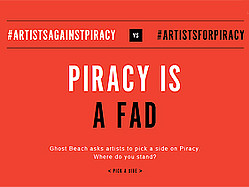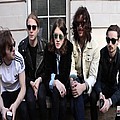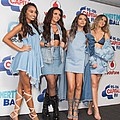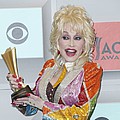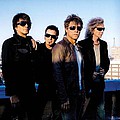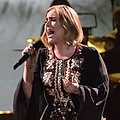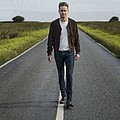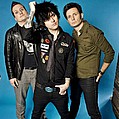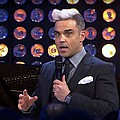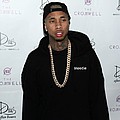Picture this scenario. You're a little-known indie rock band from Brooklyn struggling to get your music out to the world and one of America's major clothing retailers offers the use of their 15,000-square foot Times Square digital billboard for two weeks to do whatever you want.
Do you splash your name in huge letters to spread the word to all those captive shoppers, office workers and tourists to sell a bunch of albums and singles? Or, do you use the opportunity to spark a discussion about music piracy?
Most bands on the come-up would choose what's behind door #1, but not two-man act Ghost Beach, who went for the more elusive door #2.
"We decided that instead of just throwing our logo up on the billboard, why not create a discussion people can interact with?" said singer Josh Ocean of the duo's provocative art project, dubbed Artists vs. Artists. For the past week, passers-by have seen a cryptic message on the billboard flashing words such as "progress," "the future," "criminal," "a fad," "our generation," "harmless," freedom," "robbery" and "inevitable" under the words "Piracy is."
The ad, which runs for 30 seconds, four times an hour, offers up two hashtags, #artistsagainstpiracy and #artistsforpiracy, and asks those weighing in to pick a side. To date, the votes have gone overwhelming in favor of piracy (3,023) and not against (250).
What does it all mean? And is this the wave of the future in promotion for baby bands?
"What Ghost Beach is about is the experience we've set up with releasing free music almost every month on our website and the buzz that generates around that," said Ocean, 27, of the group, which is giving fans the option of buying Ghost Beach's album on iTunes for $5, or downloading it for free from their site.
"People perceive that this is a pro-piracy thing," added his band mate, Eric Mendelsohn, 26, about the overwhelming votes in favor of illegal downloading. "But it wasn't conceived that way. We've made it clear that we're not pro-piracy. We've had success, albeit small, with releasing our music for free ... which is not piracy because it's a conscious decision to give it away."
The ad is a collaboration with American Eagle, which previously licensed Ghost Beach's song "Miracle" for an online video, with a provision in the licensing agreement that gave the duo access to the billboard for two weeks. The real-world value of that ad time is around $50,000 and it was created by one of the world's leading ad agencies, TBWA\Chiat\Day New York, who took the project on pro bono.
Asked if the free exposure had led to what many bands might hope: an offer from a major label, or another big opportunity, Ocean said that too, was not the point. "This campaign isn't about the next step," he said. "When it ends, we'll have had fun with the whole process hosting a debate and hopefully a lot of great, valid points will be made."
Their next step is to just keep on keeping on: giving their music away for free through their Crazy Heart label and hitting the road with Chad Valley for a tour. Besides, they argue, as a young band in an industry where labels major and minor are more than a decade into a seeming stalemate battle to combat illegal downloads, it's not like they would be able to support themselves with album sales anyway.
"The more music we give away for free, the more we see an increase in streams and sales," said Ocean. "It also means more people coming to our shows, which heightens our profile. We're using giving away music for free as an artist development tool and it's working, which is why we felt like we should open a discussion on where the music industry is going."
The billboard comes down on Sunday and Mendelsohn hopes the conversation continues. "It's nothing to get mad at," he said. "We're not saying an artist is an a--hole for releasing music and asking fans to pay for it. We had the opportunity to do something a bit more interesting to us and it spoke to how we operate naturally. We're not changing the world, but we're doing what we want to do."
